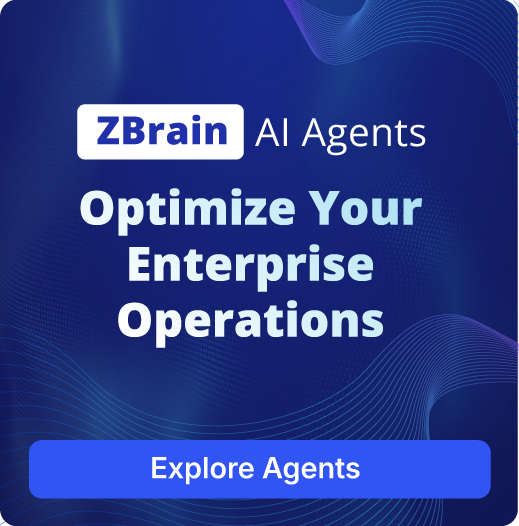Generative AI in hospitality: Scope, integration approaches, use cases, challenges and future outlook

Listen to the article
In this era of rapid technological advancement, the hospitality industry is undergoing a significant shift, propelled by the transformative capabilities of generative AI. From streamlined operations and customer service automation to personalized customer experiences, generative AI is reshaping how hospitality businesses operate, promising enhanced efficiency and unparalleled guest satisfaction.
Customer expectations are increasingly aligned with this technological shift. A recent survey by Generative AI Tracker reported that 52% of hospitality customers anticipate generative AI playing a role in customer interactions, while 44% believe it will enhance guest engagement. This aligns with the broader trend of AI adoption, with seven in ten Americans expressing a willingness to use AI for various hospitality services. Specifically, 56% would rely on generative AI for restaurant recommendations, 53% for hotel suggestions, and 51% for destination ideas.
According to McKinsey & Company research, hospitality leaders who embrace new technologies, such as customer-centric generative AI, could potentially increase revenues by up to 25%.
As we delve deeper into the world of generative AI in the hospitality industry, we’ll explore how this technology is not just a futuristic concept but a present-day tool that’s reshaping customer interactions, operational efficiency, and revenue strategies. From personalized guest service to dynamic pricing models, generative AI is poised to redefine the hospitality landscape, offering exciting opportunities for innovation and growth in an industry. This article explores the use cases of generative AI in hospitality, highlights its essential role in enhancing service and efficiency, discusses strategic integration approaches, and examines its future impact on the industry.
- What is generative AI?
- The current landscape of AI in hospitality
- Different approaches to integrating generative AI into hospitality operations
- Generative AI use cases for hospitality services
- Measuring the ROI of generative AI in hospitality services
- Challenges and considerations in adopting generative AI for hospitality
- Future outlook of generative AI in hospitality services
- Transforming hospitality services with ZBrain: A full-stack agentic AI orchestration platform
What is generative AI?
Generative AI is a form of artificial intelligence that generates new content in response to user inputs. It does this by learning patterns from data it has been trained on and creating original content that mimics these patterns. This can include text, images, videos, and more, all created through deep learning techniques involving complex neural networks. Notably, GenAI can interpret patterns and data at an advanced level, surpassing traditional machine learning capabilities.
Generative AI can be categorized into various types based on input-output modalities, such as text-to-text, text-to-image, text-to-video, and more. These models enable diverse applications, including automating email drafting, creating marketing campaigns, and generating personalized customer interactions. Popular examples of generative AI tools include OpenAI’s ChatGPT, Google’s Gemini, and Dall-E, which are widely accessible and used across industries.
Why is generative AI crucial in modern hospitality?
The core mission of the hospitality industry is to enhance the customer experience, an area characterized by intense competition and the critical need for technological advancements. Today, consumers expect to manage interactions like booking tickets, making reservations, and checking out directly from their mobile devices.
Integrating generative AI can significantly transform these processes, enhancing personalization, improving customer satisfaction, and minimizing fraud. This capability makes GenAI a valuable asset for the hospitality sector, where innovation in automated customer service is crucial to maintaining a competitive edge.
Integrating emergent generative AI technologies has become imperative for hospitality industry stakeholders. Adopting these technologies is not solely about staying current but also about fundamentally improving service quality to align with the demands of modern consumers.
The current landscape of AI in hospitality
The hospitality industry is profoundly transforming from traditional, direct human interactions to advanced AI-driven engagements. This shift is not just reshaping but fundamentally reinventing interactions between hotels and guests, streamlining operations, and setting new paradigms for future hospitality businesses.
A comprehensive overview
Generative AI is revolutionizing the hospitality industry with innovative applications that enhance guest experiences and streamline operations. In customer service, hotels are implementing advanced language models like GPT-4 to power intelligent chatbots and virtual concierges. These GenAI assistants engage in natural conversations with guests, providing personalized recommendations, handling complex inquiries, and even crafting custom itineraries on the fly. In marketing, text-to-image models such as DALL-E, Midjourney, and Stable Diffusion are being used to generate unique, eye-catching visuals for promotional materials and social media content. Additionally, GenAI tools are creating personalized marketing copy and email campaigns tailored to individual guest preferences and booking histories.
On the content creation front, generative AI is transforming how hotels present information to guests. AI-powered systems are generating detailed, engaging descriptions of hotel amenities, local attractions, and services, which can be dynamically updated based on seasonality or special events. Some luxury hotels are experimenting with AI-generated storytelling experiences, where guests can interact with virtual characters that adapt their narratives in real time based on guest inputs. In the realm of guest feedback, GenAI tools are being used to analyze and summarize guest reviews, generating insightful reports that highlight trends and areas for improvement.
These examples represent just a glimpse into the rapidly evolving landscape of generative AI in hospitality. In reality, the applications of this technology are far more extensive and diverse, with new use cases emerging regularly as the industry continues to innovate.
Market dynamics
According to the MarketResearch report, the generative AI in the hospitality market was valued at USD 16.3 billion in 2023 and is projected to reach USD 439 billion by 2033, growing at a CAGR of 40.2% from 2024 to 2033. This growth is fueled by the increasing demand for personalized guest experiences and a strong push for operational efficiency.
Driving factors:
- Enhanced customer experience: Generative AI significantly improves personalization and customer service, enhancing guest loyalty and satisfaction.
- Operational efficiency: AI provides valuable insights into customer preferences and operational data, optimizing hotel management and resource allocation.
- Cost reduction: Automation of routine tasks and predictive analytics help lower operational costs and enhance profit margins.
Integrating AI will undoubtedly redefine operational standards and service excellence as the hospitality sector evolves, paving the way for a new era of industry innovation.
Streamline your operational workflows with ZBrain AI agents designed to address enterprise challenges.
Different approaches to integrating generative AI into hospitality operations
When integrating generative AI into hospitality services, decision-makers can opt for one of three main strategies:
- Developing a custom, in-house AI stack
- Using AI point solutions
- Adopting a fully integrated platform that serves the entire organization
Each approach offers unique benefits. Let’s explore.
1. Developing a custom in-house GenAI stack
This method involves creating a tailored GenAI solution from scratch or adapting existing foundation models to meet specific organizational needs within the hospitality sector.
Advantages
- Enhanced customization: Tailors solutions to specific business requirements and guest service workflows, significantly improving guest experiences and operational efficiency.
- Enhanced security: Ensures tight control over guest data management and model training, crucial for complying with privacy regulations in hospitality.
2. Using GenAI point solutions
This strategy involves standalone applications built on top of existing large language models or GenAI features added to existing software designed to perform specific tasks, such as guest service automation or personalized marketing.
Advantages
- Task optimization: Efficiently addresses specific operational challenges, ideal for targeted needs such as personalized guest interactions or streamlined check-in processes.
- User-friendly: Easier to deploy with less technical demand, promoting wider adoption among staff.
- Quick deployment Allows rapid configuration and operational use, benefiting guest services and operations.
3. Adopting a full-stack platform like ZBrain
Opting for a comprehensive platform such as ZBrain involves integrating everything from foundational models to application layers into a single solution tailored for the hospitality industry.
Advantages
- End-to-end solutions: ZBrain provides a comprehensive suite of tools, allowing enterprises to handle every aspect of their AI projects, from data preparation to model integration, all within a single platform. This eliminates the need for multiple, disconnected tools, improving efficiency and reducing complexity.
- Faster AI implementation: With pre-built tools, advanced orchestration, and streamlined workflows, ZBrain accelerates the AI implementation process, enabling enterprises to deploy AI solutions more quickly.
- Customizability: Enterprises can tailor their solutions to meet their specific needs, ensuring they align with their unique business processes and goals. This flexibility enhances operational efficiency and optimizes AI performance.
- Scalability: ZBrain is built to handle the scale required by large enterprises, making it easy to scale solutions as business needs grow. This scalability allows businesses to evolve their AI strategy without having to invest in entirely new platforms.
- Security and compliance: ZBrain offers robust security and is designed to meet enterprise-grade compliance standards, ensuring that sensitive data is protected throughout the AI development lifecycle.
- Data integration and management: ZBrain simplifies the integration of proprietary data and external data sources, ensuring seamless data usage. This is crucial for creating accurate, data-driven AI solutions for enterprises with complex data ecosystems.
- Optimized model performance: ZBrain enables the fine-tuning of GenAI models, ensuring that enterprises achieve the best possible performance from their applications with continuous optimization options.
- Reduced costs: ZBrain provides all the necessary tools in one platform, eliminating the need for multiple specialized resources and reducing overall AI development costs. This streamlines the process and cuts expenses associated with hiring diverse expertise.
Choosing the right generative AI solution for hospitality operations depends on specific needs, available resources, and strategic goals. Each option provides varying control, customization, and complexity, requiring alignment with your business objectives and compliance needs.
Generative AI use cases for hospitality services
This section comprehensively discusses the use cases of generative AI in hospitality across various functions and how ZBrain practically implements them:
Front desk operations
-
Generating personalized welcome messages: Automatically creates tailored greetings based on guest history and preferences, enhancing personal connection upon arrival.
-
Analyzing check-in patterns: Optimizes the check-in process by identifying busy times and guest preferences, allowing for smoother operations and personalized service adjustments.
-
Automating room assignments: Assigns rooms based on guest preferences, loyalty status, and operational efficiency.
-
Real-time language translation: Implement AI-powered translation tools for seamless communication with international guests.
-
Guest feedback collection and analysis: Collects and analyzes feedback during the check-out process to gauge guest satisfaction and identify areas for improvement.
The table below summarizes the use cases in front desk operations and corresponding capabilities of ZBrain:
|
Generative AI Use Case |
Description |
How ZBrain Helps |
|---|---|---|
|
Generating personalized welcome messages |
Creation of tailored greetings based on guest history and preferences. |
ZBrain automates personalized greetings, ensuring each guest feels uniquely welcomed upon arrival. |
|
Analyzing check-in patterns |
Analysis of check-in data, identifying peak times and preferences to streamline operations and enhance guest experiences. |
ZBrain enhances check-in efficiency by analyzing and providing actionable insights based on guest arrival patterns. It processes historical and real-time data, helping to optimize staff allocation and prepare resources according to observed trends. |
|
Automating room assignments |
Automated rooms assignment based on guest preferences and loyalty status. |
ZBrain enhances room assignment processes, ensuring guests receive rooms that meet their preferences and benefits. |
|
Real-time language translation |
Facilitates communication with international guests, removing language barriers. |
ZBrain’s real-time translation capabilities enhance communication and service for international guests. |
|
Guest feedback collection and analysis |
Feedback collection and analysis during the check-out process to gauge guest satisfaction and identify areas for improvement. |
ZBrain can automatically process and analyze feedback, providing real-time insights and alerts to management about potential issues or positive experiences. |
Housekeeping management
-
Developing smart cleaning schedules: Based on guest schedules and preferences, it determines the best times for room cleaning, ensuring minimal disruption and optimizing service schedules.
-
Optimizing resource allocation: Analyzes housekeeping data to help manage resources more effectively, from staff assignments to procuring cleaning supplies.
-
Personalizing room setup: Customizes room arrangements based on guest preferences and past stays.
-
Automated inventory management for supplies: Automatically tracks and manages inventory levels of various supplies, ordering replacements as needed without manual intervention.
Check housekeeping management-related use cases and ZBrain’s capabilities:
|
Generative AI Use Case |
Description |
How ZBrain Helps |
|---|---|---|
|
Developing smart cleaning schedules |
Preparation of cleaning schedules based on guest schedules and preferences, ensuring minimal disruption. |
ZBrain can optimize cleaning schedules to minimize guest disruption by suggesting the best times for room services. |
|
Optimizing resource allocation |
Effective management of resources, from staff assignments to procuring cleaning supplies. |
ZBrain enhances resource management by analyzing housekeeping data for better staff assignments and supply procurement. |
|
Personalizing room setup |
Customization of room arrangements based on guest preferences and past stays. |
ZBrain helps customize room setups to match guest preferences, enhancing their stay experience. |
|
Automated inventory management for supplies
|
Automatically tracks and manages inventory levels of supplies, ordering replacements as needed. |
ZBrain integrates with inventory systems to automate the management of supplies, ensuring optimal stock levels are maintained. |
Food and beverage services
-
Generating dynamic menu recommendations: Analyzes current trends, inventory levels, and guest preferences to suggest menu options, helping to maximize satisfaction and reduce waste.
-
Content creation for marketing: Generates engaging content for marketing campaigns, including promotional descriptions, themed menu ideas, and event-specific dining options.
-
Feedback analysis and menu optimization: Analyzes customer feedback to gauge satisfaction and identify areas for improvement.
This table presents key GenAI use cases in food and beverage services with respective ZBrain capabilities:
|
Use Case |
Description |
How ZBrain Helps |
|---|---|---|
|
Dynamic menu recommendations |
Suggesting menu options based on trends, inventory, and guest preferences. |
ZBrain optimizes menu offerings and generates dynamic recommendations to enhance guest satisfaction and reduce waste. |
|
Content creation for marketing |
Automating the creation of various marketing content |
ZBrain produces engaging and relevant content, saving time and aligning with marketing goals. This can include promotional materials, offers and social media posts. |
|
Feedback analysis and menu optimization |
Guest feedback analysis post-visit or post-interaction to assess satisfaction and pinpoint improvement areas. |
ZBrain interprets feedback accurately, offering actionable insights to elevate service quality. |
Event planning
-
Creating event proposals: Creates customized event proposals and adjusts offerings based on guest feedback and previous successes to meet current expectations.
-
Optimizing event layouts and scheduling: Analyzes past attendance and guest preferences, offering recommendations for ideal setups, schedules, and themes that will likely attract more participants.
-
Automating event follow-ups: Sends personalized follow-up messages and surveys after events.
-
Real-time content adaptation: GenAI can dynamically adjust content delivery based on live feedback and interaction patterns, ensuring the material remains relevant and engaging for attendees.
-
Personalized networking recommendations: GenAI can analyze attendee profiles and interests to suggest potential networking opportunities, facilitating more meaningful connections during the event.
Check GenAI use cases and corresponding ZBrain capabilities for effective event planning.
|
Generative AI Use Case |
Description |
How ZBrain Helps |
|---|---|---|
|
Creating event proposals |
Generation of customized proposals based on guest feedback and past successes. |
ZBrain crafts tailored event proposals that align with current guest expectations and feedback. Its feedback summarization agent compiles concise summaries of customer feedback to highlight key trends and common issues. |
|
Optimizing event layouts and scheduling |
Optimizing event arrangements to attract and accommodate more guests. |
ZBrain can analyze past attendance and preferences to recommend event setups, schedules, and themes. |
|
Automating event follow-ups |
Sending personalized follow-up messages and surveys post-event. |
ZBrain automates post-event communication, enhancing guest engagement and gathering valuable feedback. Its follow-up reminder agent categorizes follow-up reminders based on timelines, removing the need for manual tracking. |
|
Real-time content adaptation |
Dynamically adjusting content delivery based on live feedback and interaction patterns. |
ZBrain utilizes real-time data to modify content delivery at events, ensuring it resonates with the current audience and maintains engagement. Its social media content generator agent crafts engaging social media content to boost online presence and drive higher engagement. |
|
Personalized networking recommendations |
Analysis of attendee profiles and interests to facilitate meaningful networking. |
ZBrain analyzes attendee interests and professional backgrounds to suggest potential networking matches, enhancing the experience and fostering connections. |
Guest services
-
Formulating personalized recommendations: Examines guest profiles and past behaviors to suggest activities, services, or local attractions that enhance the guest experience.
-
Automated customer service with AI chatbots: Generative AI chatbots handle routine inquiries and provide instant support, freeing up staff for more complex issues.
-
Availing multilingual support: Enables real-time translation services, improving communication with international guests.
-
Customized itinerary building: Generative AI enables the creation of personalized itineraries based on guest profiles and preferences.
Explore ZBrain’s capabilities for different guest services-related use cases:
|
Generative AI Use Case |
Description |
How ZBrain Helps |
|---|---|---|
|
Formulating personalized recommendations |
Examining guest profiles and past behaviors to suggest activities, services, or local attractions. |
ZBrain analyzes guest data to provide personalized recommendations improving guest experience. Its response suggestion agent enables AI-generated response suggestions for common customer queries. |
|
Automated customer service with AI chatbots |
Generative AI chatbots can handle routine inquiries and provide instant support. |
ZBrain’s AI chatbots streamline customer service, allowing staff to focus on more complex needs. Also, its inquiry routing agent routes customer inquiries to the appropriate department based on the context of the inquiry. |
|
Availing multilingual support |
Real-time translation to improve communication with international guests. |
ZBrain supports multilingual interactions, ensuring all guests receive personalized and understandable communication. |
|
Customized itinerary building |
Generation of personalized itineraries based on guest profiles and preferences. |
ZBrain utilizes guest data to craft detailed itineraries that are customized to each guest’s interests and schedule, enhancing overall experience. |
Maintenance
-
Translating maintenance data into cost-saving measures: Analyzes maintenance records to find efficiencies and cost-saving opportunities, prolonging equipment life and reducing capital expenditures.
-
Automating maintenance inventory management: Tracks and reorders maintenance supplies, ensuring optimal stock levels.
-
Automated maintenance ticket generation: Creates detailed maintenance tickets based on guest feedback and sensor data, streamlining issue reporting.
This table compiles GenAI use cases and corresponding capabilities of ZBrain:
|
Use Case |
Description |
How ZBrain Helps |
|---|---|---|
|
Translating maintenance data into cost-saving measures |
Analysis of maintenance records to find efficiencies and cost-saving opportunities. |
ZBrain processes maintenance data to uncover cost savings and extend equipment life. Its product quality monitoring agent monitors supplier product quality by analyzing inspection reports and defect rates, flagging any deviations. |
|
Automating maintenance inventory management |
Tracking and reordering maintenance supplies to ensure optimal stock levels. |
ZBrain streamlines inventory management for maintenance supplies, ensuring efficient use and replenishment. Its purchase order prioritization agent suggests prioritizing purchase orders based on maintenance supplies’ needs. |
|
Automated maintenance ticket generation |
Creating detailed maintenance tickets based on guest feedback and sensor data. |
ZBrain automates the creation of maintenance tickets, facilitating quicker resolutions and streamlined operations. |
Marketing
-
Devising targeted promotional content: Creates and optimizes marketing content based on guest data, ensuring messages are tailored to the interests of specific segments.
-
Analyzing marketing ROI and effectiveness: Measures and analyzes the impact of different marketing strategies, refining approaches based on data-driven insights.
-
Personalizing email campaigns: Crafts and sends highly personalized email marketing messages based on guest preferences and behavior.
-
Optimizing social media engagement: Determines the best times and content for social media posts to maximize engagement.
Here is a table comprising GenAI use cases and associated ZBrain capabilities:
|
Generative AI Use Case |
Description |
How ZBrain Helps |
|---|---|---|
|
Devising targeted promotional content |
Creating and optimizing marketing content based on guest data to target specific segments effectively. |
ZBrain utilizes guest data to generate and tailor promotional content, driving engagement. For example, its blog topic generation agent can generate blog topics based on trending keywords and audience interests. |
|
Analyzing marketing ROI and effectiveness |
Measuring and analyzing the impact of marketing strategies to refine approaches based on insights. |
ZBrain helps evaluate marketing strategies, optimizing ROI and strategic effectiveness. Its market research and summarization agent drives key insights. Also, its fact checking agent checks the accuracy of marketing content by cross-referencing data. |
|
Personalizing email campaigns |
Crafting and sending highly personalized email messages based on guest preferences and behavior. |
ZBrain’s email campaign personalization agent generates personalized email content for launch campaigns using customer segmentation data. |
|
Optimizing social media engagement |
Determining the optimal times and content for social media posts to maximize engagement. |
ZBrain analyzes engagement data to schedule social media posts, ensuring maximum visibility and interaction. Its social media trend monitoring agent tracks and analyzes social media to spot emerging trends, aiding marketing teams to adapt strategies effectively. |
Security
-
Creating AI-optimized security patrol routes: Analyzes historical incident data and guest traffic to optimize patrol routes and schedules. Generative AI would simulate various potential security incidents and generate effective response strategies, creating novel solutions that are not directly derived from past data alone.
-
Interactive security training: GenAI designs interactive training modules that dynamically adjust content and difficulty based on user performance and feedback, enhancing security personnel’s skills effectively.
-
Automated security briefings: Automates the creation of daily security briefings, ensuring staff are consistently updated with the latest security statuses and insights.
Summarising the use cases with capabilities offered by ZBrain:
|
Generative AI Use Case |
Description |
How ZBrain Helps |
|---|---|---|
|
Creating AI-optimized security patrol routes |
Simulating and optimizing security patrols, enhancing safety and efficiency. |
ZBrain can analyze historical incident data and guest traffic to optimize patrol routes and schedules. |
|
Interactive security training |
Providing training modules that adapt to the learning progress and feedback of security personnel. |
ZBrain enhances security training programs with GenAI-driven simulations that adjust to the skill levels and feedback of participants, fostering more effective learning environments. |
|
Automated security briefings |
Creation of daily security briefings and updates for staff based on the latest data and evolving threat landscapes. |
ZBrain generates daily security briefings, ensuring all personnel are informed and aware of current security updates. |
Streamline your operational workflows with ZBrain AI agents designed to address enterprise challenges.
Personalized guest experiences
-
Tailoring loyalty programs: Generates personalized rewards and offers based on guest preferences and past behavior, boosting program engagement.
-
Personalized room recommendations: Tailors room options based on guest preferences, past stays, and specific needs, enhancing guest satisfaction.
-
Customized in-room entertainment: Curates personalized media selections, offering guests a bespoke entertainment experience with tailored movies, music, and shows.
-
Dynamic dining suggestions: Generates personalized dining options by analyzing guest preferences, dietary needs, and local cuisine, enhancing the dining experience.
-
Customized activity planning: Analyzes guest’s interests and past activities to propose custom activity schedules. This could include tailored sightseeing tours, recommended local events, and special interest activities like cooking classes or art workshops that align with the guest’s preferences.
-
Personalized shopping recommendations: Provides personalized shopping recommendations, suggesting nearby shops or online stores that match the guest’s taste and purchase history, enhancing their overall experience.
Explore these use cases with corresponding ZBrain capabilities to materialize them:
|
Generative AI Use Cases |
Description |
How ZBrain Helps |
|---|---|---|
|
Tailoring loyalty programs |
Generating personalized rewards and offers based on guest preferences and past behavior, boosting program engagement. |
ZBrain utilizes advanced data analysis to tailor loyalty programs, enhancing customer satisfaction and loyalty. Its customer feedback sentiment analysis agent analyzes customer feedback from various channels to determine sentiment. |
|
Personalized room recommendations |
Customization of room options based on guest preferences, past stays, and specific needs, enhancing guest satisfaction. |
ZBrain analyzes guest data to provide customized room suggestions, improving the booking experience. |
|
Customized in-room entertainment |
Enhancing guest experience through bespoke in-room entertainment options. |
ZBrain helps deliver tailored entertainment options, such as personalized media selections, to enhance the in-room experience, boosting guest satisfaction. |
|
Dynamic dining suggestions |
Generating personalized dining options by analyzing guest preferences, dietary needs, and local cuisine, enhancing the dining experience. |
ZBrain provides dynamic dining suggestions to meet individual guest needs, improving satisfaction. |
|
Customized activity planning |
Analysis of guest interests and past activities to propose custom activity schedules. |
ZBrain crafts personalized activity itineraries, enhancing guest engagement and satisfaction. This could include tailored sightseeing tours, recommended local events, and special interest activities like art workshops. |
|
Personalized shopping recommendations |
Providing shopping suggestions that match the guest’s taste and purchase history, enhancing the shopping experience. |
ZBrain analyzes guest preferences to recommend shopping suggestions, personalizing the shopping journey for each guest. |
Staff training and management
-
Developing adaptive training modules: GenAI-powered adaptive training modules track metrics like response time and accuracy and adjust difficulty and content to personalize learning and enhance staff performance.
-
Automating performance reviews: Analyzes staff performance data and provides objective feedback and improvement suggestions.
-
Enhancing internal communication: Improves information sharing and collaboration among staff across different departments with specialized tools.
This table summarizes the GenAI use cases and respective capabilities offered by ZBrain:
|
Generative AI Use Cases |
Description |
How ZBrain Helps |
|---|---|---|
|
Developing adaptive training modules |
Creation of training modules that adjust based on staff performance, providing tailored learning experiences. |
ZBrain automates and customizes training scenarios to enhance staff learning and adaptation. Its training module assignment agent automatically assigns relevant training modules to new hires based on their specific roles. |
|
Automating performance reviews |
Analysis of staff performance data to offer objective feedback and improvement suggestions. |
ZBrain processes performance data to provide timely and constructive feedback, promoting staff development. |
|
Enhancing internal communication |
Improving information sharing and collaboration among staff across different departments with specialized tools. |
ZBrain facilitates seamless communication across departments, enhancing teamwork and operational coherence. |
Revenue management
-
Optimizing distribution channels: Determines the most effective distribution channels for different customer segments and seasons.
-
Analyzing cancellation patterns: Identifies patterns in cancellations and no-shows, allowing for more accurate overbooking strategies.
-
Package optimization: Generates optimal package offers by analyzing guest preferences and past purchasing behaviors, creating attractive deals that increase upselling opportunities.
Explore key generative AI use cases in revenue management and how ZBrain helps fulfill them:
|
Generative AI Use Cases |
Description |
How ZBrain Helps |
|---|---|---|
|
Optimizing distribution channels |
Determining the most effective distribution channels for different customer segments and seasons. |
ZBrain analyzes market data to optimize distribution strategies, enhancing reach and profitability. |
|
Analyzing cancellation patterns |
Identifying patterns in cancellations and no-shows, allowing for more accurate overbooking strategies. |
ZBrain’s data analysis capabilities help formulate more effective overbooking and cancellation policies. |
|
Package optimization |
Analyzing guest preferences and purchasing behaviors to create optimal package offers. |
ZBrain facilitates the creation of attractive package deals that maximize upselling opportunities by leveraging guest data insights. |
Why is ZBrain the go-to generative AI solution for modern hospitality needs?
In today’s fast-paced hospitality industry, where efficiency and personalization are paramount, ZBrain offers the ideal generative AI solution. It simplifies and accelerates the development of AI-powered applications, allowing businesses to stay ahead while addressing the growing demands of their operations. In an industry where time and resources are often limited, ZBrain provides a streamlined platform that enables hospitality businesses to build, customize, and deploy AI-driven applications from start to finish, all without the need for a dedicated development team. This not only saves valuable time but also significantly reduces costs, making it far more affordable than hiring a full team of developers.
What sets ZBrain apart is its flexibility. As a model-agnostic and cloud-agnostic platform, it allows businesses to build generative AI applications using any AI model and deploy them on the cloud of their choice—or even self-host them. This versatility ensures that hospitality providers can tailor their AI solutions to meet specific operational needs, while maintaining control over their infrastructure.
Whether it’s personalized guest services, dynamic room recommendations, or real-time conversational assistance, ZBrain empowers hotels to deliver superior guest experiences and optimize operations—making it the ultimate AI solution for modern hospitality.
Security is also strengthened with ZBrain, which implements AI-optimized patrol routes and smart access systems using facial recognition to ensure a secure environment for guests and staff.
By automating and optimizing these facets of hospitality management, the platform improves operational efficiency and elevates the overall guest experience, positioning hospitality businesses to better meet the needs of modern customers.
Measuring the ROI of generative AI in hospitality services
In the rapidly evolving hospitality sector, the Return on Investment (ROI) from generative AI is quantified by assessing both the direct financial gains and the qualitative improvements in guest satisfaction and decision-making efficiency. This involves carefully examining the initial and ongoing costs against the tangible benefits realized through AI deployment. The process typically combines quantitative metrics such as operational cost reductions, revenue enhancements, and qualitative improvements in automated customer service and operational agility.
Key ROI indicators from ZBrain implementation in hospitality businesses:
- Reduced operational costs:
- Use case: Automated guest check-ins.
- ROI metrics: Reduction in front desk labor costs, reduced guest wait times.
- Example: ZBrain has the potential to streamline check-in processes, minimizing the need for front desk staff during busy periods. Implementing ZBrain for automated check-ins could significantly reduce guest wait times and lower front desk labor costs.
- Improved customer satisfaction:
- Use case: Personalized guest services and responsiveness
- ROI metrics: Increase in guest satisfaction scores and repeat visits.
- Example: Through personalized guest interactions, ZBrain enhances the overall experience, potentially leading to higher satisfaction rates. By using ZBrain to customize guest room conditions and entertainment options, hotels can see notable improvements in guest reviews and an increase in return visits.
- Faster decision-making processes:
- Use case: Real-time room pricing adjustments.
- ROI metrics: Overall revenue growth.
- Example: ZBrain aids managers in making quick, data-driven decisions about room pricing and staff allocations, significantly impacting revenue and efficiency. Hotels utilizing ZBrain’s dynamic pricing solutions can see noticeable improvements in revenue per available room (RevPAR).
- Streamlined resource management:
- Use case: Optimized housekeeping schedules.
- ROI metrics: Improvement in housekeeping operational efficiency, reduction in related overhead costs.
- Example: By optimizing housekeeping schedules based on real-time occupancy data, ZBrain helps hotels minimize operational downtime and maximize room availability, improving housekeeping efficiency.
- Enhanced marketing effectiveness:
- Use case: Personalized marketing communications.
- ROI metrics: Increase in email campaign engagement, increase in direct bookings from marketing initiatives.
- Example: Utilizing ZBrain’s capabilities to tailor marketing messages based on guest preferences and behavior can significantly increase engagement on targeted email campaigns for hotels, potentially boosting booking rates.
By integrating these quantitative and qualitative outcomes, hospitality businesses can articulate a compelling case for the ROI of generative AI. The ability to reduce costs while simultaneously improving guest experiences and operational responsiveness illustrates the profound impact of generative AI platforms like ZBrain in the hospitality industry.
Challenges and considerations in adopting generative AI for hospitality
While generative AI offers transformative potential for the hospitality industry, integrating this technology into corporate structures like hotel chains and restaurant groups presents specific challenges. These encompass technological hurdles and require significant shifts in organizational processes and culture. Here’s a closer look at the strategic considerations and challenges faced during this adoption:
- Integrating with legacy systems: Many hospitality organizations rely on established legacy systems, which can be incompatible with new AI technologies. Integrating generative AI requires either significant modifications to existing systems or a complete overhaul, posing both technical and financial challenges.
- Data privacy and security concerns: As generative AI processes vast amounts of guest data, ensuring the security and privacy of this data is paramount. Hospitality companies must implement robust security measures to protect sensitive information and prevent data breaches.
- Compliance with regulations: The global nature of the hospitality industry means companies must navigate a complex landscape of regulations, including data protection laws like GDPR. Generative AI systems must be designed to comply fully with these regulations to avoid legal penalties and reputational damage.
- Aligning AI with departmental goals: Effective use of AI requires aligning its capabilities with the specific objectives and key results (OKRs) of each department within the hospitality industry. This alignment ensures that AI initiatives support broader business goals and deliver measurable benefits.
- Data quality and management: AI systems require high-quality, well-managed data to function effectively. In the hospitality sector, ensuring the accuracy, completeness, and consistency of guest data across multiple points of interaction is a significant challenge.
- Cultural resistance to change: Introducing AI technologies can meet resistance from employees accustomed to traditional ways of working. Managing this change requires careful communication, management buy-in, and demonstrating the tangible benefits of AI to all staff members.
- Training and empowerment: Tailored training programs help staff understand and utilize AI tools effectively. These programs should address both the technical aspects of AI and its practical applications in daily hospitality operations.
ZBrain simplifies the integration of generative AI into the hospitality sector by offering robust data security, seamless compatibility with existing systems, and enhanced transparency for regulatory compliance. The platform facilitates continuous learning and sophisticated data management, enabling hospitality organizations to optimize workflows while ensuring ethical and regulatory adherence.
Adopting generative AI in hospitality presents transformative potential but requires a strategic approach to overcome inherent challenges. By addressing technical, operational, cultural, and regulatory considerations, hospitality businesses can leverage AI to boost efficiency, personalize guest experiences, and gain a competitive edge.
Streamline your operational workflows with ZBrain AI agents designed to address enterprise challenges.
Future outlook of generative AI in hospitality services
As the hospitality sector continues to evolve, generative AI is set to play a pivotal role in shaping its future, promising to redefine guest experiences, operational efficiencies, and service personalization. Here are the long-term trends and future applications of generative AI in hospitality, along with the evolving role of platforms like ZBrain in driving these advancements.
Long-term trends and future applications of generative AI in hospitality
- Enhanced personalization: Generative AI will enable hospitality providers to offer unparalleled personalization, from tailored itineraries to customized room settings and dining experiences. By analyzing vast amounts of data, including past preferences, real-time interactions, and even social media activities, AI can offer predictions and recommendations that cater uniquely to individual guest needs.
- Operational efficiency through automation: Generative AI’s ability to automate complex and repetitive tasks will significantly reduce operational costs and improve service delivery. For example, AI-driven systems can manage bookings, check-ins, and customer inquiries with greater accuracy and speed, allowing staff to focus on enhancing guest services.
- Predictive maintenance and sustainability: Predictive analytics will enable timely maintenance of facilities, ensuring that equipment failures are handled before they disrupt the guest experience. Furthermore, AI will support sustainability initiatives by optimizing energy consumption and reducing waste, aligning with the growing global emphasis on eco-friendly practices.
- Advanced security measures: Generative AI will also enhance security protocols within the hospitality industry. AI-enabled surveillance systems can monitor and analyze activities in real time, ensuring guest safety through faster and more precise responses to potential threats.
- GenAI in culinary experiences: Generative AI will assist in menu customization, managing dietary preferences and allergies, and even help in designing new dishes based on current culinary trends analyzed through global data.
The future of generative AI in hospitality looks promising, with platforms like ZBrain leading the charge. As AI continues to advance, its integration into hospitality services will drive significant cost reductions and efficiency improvements and elevate the overall guest experience. Hospitality businesses that embrace these AI capabilities effectively will likely set new standards for service excellence and innovation in the industry.
Transforming hospitality services with ZBrain: A full-stack agentic AI orchestration platform
ZBrain, with its AI capabilities, helps hospitality businesses enhance guest experiences, streamline operations, and optimize service management. It offers a range of features designed to improve efficiency, personalize customer interactions, and drive revenue growth.
-
AI readiness assessment: ZBrain’s AI readiness assessment framework, ZBrain XPLR, evaluates a hospitality organization’s preparedness for AI adoption, providing actionable insights to optimize guest services, booking management, and operational workflows.
-
Low-code development: ZBrain’s low-code platform, ZBrain Builder, enables hospitality providers to create custom AI solutions for reservations, customer engagement, and service automation without requiring extensive technical expertise.
-
Proprietary data utilization: The platform allows organizations to leverage proprietary customer data effectively, enabling AI-driven personalization for guest experiences, pricing optimization, and tailored service recommendations.
-
Enterprise-ready: Designed for large-scale hospitality operations, ZBrain Builder offers security, scalability, and seamless integration with property management systems (PMS), customer relationship management (CRM), and booking platforms.
-
End-to-end support: ZBrain Builder manages the entire hospitality service lifecycle—from guest inquiries and reservations to personalized service recommendations and post-stay feedback—ensuring a seamless and engaging experience.
-
Flexible data ingestion: ZBrain integrates data from multiple sources, including booking engines, guest profiles, and feedback channels, to provide real-time insights that enhance decision-making and operational efficiency.
-
Intelligent agent creation: AI agents built on ZBrain Builder can automate key hospitality tasks, such as responding to guest inquiries, managing room allocations, and optimizing service delivery, reducing manual effort and improving efficiency.
These capabilities position ZBrain as a transformative tool for hospitality businesses, helping them deliver exceptional guest experiences, optimize resources, and drive operational excellence.
Endnote
As we delve into the transformative potential of generative AI in the hospitality industry, it’s clear that embracing this technology is not just beneficial but pivotal for businesses aiming to enhance efficiency, improve personalized guest experiences, and maintain competitiveness in a rapidly evolving market. The adoption of generative AI enables not just incremental improvements but substantial shifts in operational approaches and guest interactions, setting a new standard in the industry.
The future of hospitality with generative AI promises streamlined operations, enhanced customer satisfaction, and innovative service offerings that can significantly differentiate businesses in this sector. For those in the hospitality industry, now is the time to explore and integrate these technologies to not only meet current guest expectations but to anticipate and shape future trends.
In essence, generative AI is reshaping the hospitality landscape, offering a gateway to a future where technology and human-centric service merge to create unparalleled guest experiences.
Ready to transform your hospitality operations? Contact us today and see how ZBrain can streamline your services and elevate your guest experiences.
Listen to the article
Author’s Bio

An early adopter of emerging technologies, Akash leads innovation in AI, driving transformative solutions that enhance business operations. With his entrepreneurial spirit, technical acumen and passion for AI, Akash continues to explore new horizons, empowering businesses with solutions that enable seamless automation, intelligent decision-making, and next-generation digital experiences.
Table of content
- What is generative AI?
- The current landscape of AI in hospitality
- Different approaches to integrating generative AI into hospitality operations
- Generative AI use cases for hospitality services
- Measuring the ROI of generative AI in hospitality services
- Challenges and considerations in adopting generative AI for hospitality
- Future outlook of generative AI in hospitality services
- Transforming hospitality services with ZBrain: A full-stack agentic AI orchestration platform
Frequently Asked Questions
What is ZBrain, and how can it optimize hospitality operations with generative AI?
ZBrain is an end-to-end AI enablement platform that assists hospitality businesses in seamlessly integrating gen AI into their operations, enhancing guest experiences, optimizing processes, and informing strategic decision-making. From assessing AI readiness to deploying intelligent solutions, ZBrain empowers hospitality teams to improve efficiency, personalize services, and align operational strategies with business objectives.
Here’s how ZBrain enhances hospitality operations:
-
AI readiness assessment with ZBrain XPLR: ZBrain XPLR offers a comprehensive AI readiness assessment, enabling hospitality teams to evaluate current processes and identify areas for AI-driven optimization. This strategic approach to AI adoption enhances guest services, operational efficiency, and customer engagement.
-
Seamless data ingestion and integration: ZBrain Builder integrates with property management systems (PMS), reservation platforms, and customer relationship management (CRM) tools to unify data from multiple sources. This enables real-time analytics, assisting hospitality teams in making data-driven decisions on pricing, inventory management, and guest personalization.
-
Low-code development environment: ZBrain Builder’s intuitive, low-code interface allows hospitality professionals to create and deploy gen AI-driven solutions with minimal technical expertise. This accelerates automation in key processes, such as booking management, guest communications, and feedback analysis.
-
Cloud and model flexibility: ZBrain Builder supports advanced AI models like GPT-4 and LLaMA and integrates with cloud platforms like AWS, Azure, and GCP. This flexibility allows hospitality teams to deploy scalable AI solutions tailored to their organization’s unique needs.
-
Enhanced compliance and governance: ZBrain’s AI-driven analytics assist hospitality teams in ensuring compliance with industry regulations, data privacy laws, and internal policies. By continuously monitoring operational data, ZBrain identifies potential risks related to guest data handling, pricing strategies, and service quality.
By combining powerful AI capabilities with seamless data integration, ZBrain enables hospitality organizations to optimize operational strategies, improve service efficiency, and create a more agile, future-ready hospitality function.
How does ZBrain ensure the security and privacy of sensitive data in hospitality operations?
ZBrain is designed with a strong focus on data privacy and security, ensuring that sensitive information—such as guest records, payment details, and operational analytics—is protected at all stages. Here’s how ZBrain safeguards data throughout the hospitality operational lifecycle:
Private cloud deployments:
ZBrain offers deployment in a private self-hosted cloud infrastructure, ensuring that critical hospitality data, including guest information and transaction records, remains securely stored within the organization’s infrastructure.
Robust security features:
ZBrain incorporates multiple layers of security to protect sensitive hospitality data, including:
-
Access controls: Granular role-based access controls ensure only authorized personnel can view or manage confidential data, such as guest profiles, booking details, and financial transactions.
-
Anonymization and compliance monitoring: ZBrain’s risk governance feature enhances data safety by identifying and removing risky information and replacing it with synthetic data, minimizing potential risks related to privacy and confidentiality.
Compliance and governance:
ZBrain is built to meet global compliance standards ISO 27001:2022 and SOC 2 Type II, ensuring that hospitality data is managed with confidentiality, integrity, and accountability. These certifications demonstrate a commitment to robust information security management systems and effective internal controls.
By integrating these security and compliance measures, ZBrain enables hospitality organizations to leverage gen AI-driven operations while ensuring that guest data remains protected and regulatory requirements are met.
Can ZBrain AI agents be integrated with existing hospitality management systems?
Yes, ZBrain AI agents are designed to integrate seamlessly with existing hospitality management systems, including property management systems (PMS), reservation platforms, customer relationship management (CRM) software, and other operational tools. The platform supports various data formats and standards, ensuring smooth interoperability with both modern and legacy hospitality technologies.
This integration enables hospitality organizations to:
-
Leverage existing infrastructure: Enhance current operations without the need for a complete overhaul of existing systems.
-
Enrich data and workflows: Connect ZBrain AI agents with existing tools to automate reservation management, guest communication, inventory control, and compliance monitoring.
-
Drive AI-driven insights: Utilize gen AI capabilities to optimize pricing strategies, enhance guest experiences, and improve operational decision-making while maintaining compatibility with current technologies.
By enabling seamless integration, ZBrain ensures that hospitality teams can modernize their operations without disrupting existing ecosystems, leading to improved efficiency, data-driven decision-making, and strategic agility.
What AI agents can be built on ZBrain for hospitality operations?
ZBrain enables organizations to build generative AI-powered agents that enhance decision-making, automate critical hospitality processes, and optimize operational strategies. With ZBrain Builder, businesses can develop AI agents tailored to various hospitality functions, ensuring seamless integration with existing management systems and data sources.
Key AI agents that can be built on ZBrain:
-
Guest experience enhancement agent: Analyzes guest feedback and preferences to personalize services, improving satisfaction and loyalty.
-
Reservation management optimization agent: Automates booking processes, manages cancellations, and optimizes room allocation to maximize occupancy rates.
-
Pricing and revenue management agent: Assesses market data to analyze demand and competitor pricing to recommend dynamic pricing strategies, enhancing revenue.
-
Inventory and supply chain management agent: Monitors inventory levels and streamlines procurement to reduce waste and costs.
-
Regulatory compliance monitoring agent: Tracks adherence to health and safety regulations, flags potential compliance issues, and ensures alignment with industry standards.
By leveraging ZBrain’s AI-driven automation and analytics, hospitality organizations can streamline operations, enhance guest experiences, and build more responsive, data-driven strategies.
How does ZBrain cater to diverse operational and strategic needs across hospitality services?
ZBrain’s flexibility enables hospitality organizations to build gen AI-driven solutions tailored to various operational and strategic needs, from guest experience enhancement and reservation management to pricing optimization and compliance. With custom AI agents, hospitality teams can automate booking processes, personalize guest interactions, optimize pricing strategies, analyze guest feedback, and ensure regulatory compliance. By leveraging ZBrain’s intelligent automation and data-driven insights, businesses can create more strategic, agile, and efficient operations, driving better decision-making and guest satisfaction.
How can I get started with ZBrain for enhancing hospitality operations?
To leverage ZBrain for optimizing your hospitality operations, contact us at hello@zbrain.ai or fill out the inquiry form on our website. Our team will connect with you to discuss how ZBrain can integrate with your existing systems, automate key processes, and enhance guest experiences, operational efficiency, and compliance strategies.
Insights
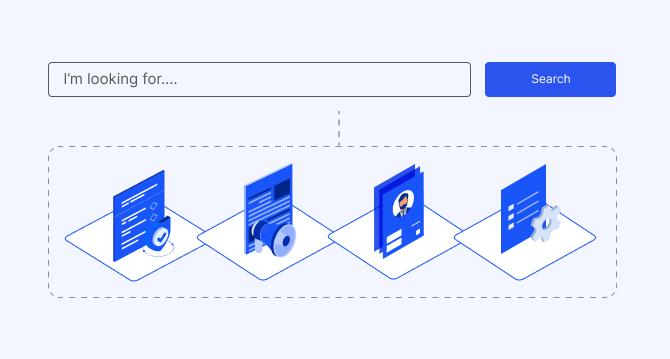
A guide to intranet search engine
Effective intranet search is a cornerstone of the modern digital workplace, enabling employees to find trusted information quickly and work with greater confidence.
Enterprise knowledge management guide
Enterprise knowledge management enables organizations to capture, organize, and activate knowledge across systems, teams, and workflows—ensuring the right information reaches the right people at the right time.
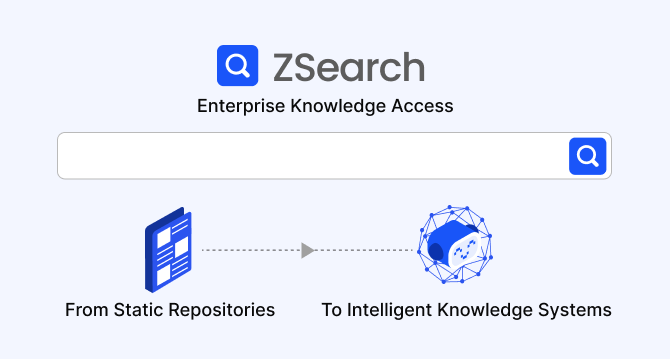
Company knowledge base: Why it matters and how it is evolving
A centralized company knowledge base is no longer a “nice-to-have” – it’s essential infrastructure. A knowledge base serves as a single source of truth: a unified repository where documentation, FAQs, manuals, project notes, institutional knowledge, and expert insights can reside and be easily accessed.
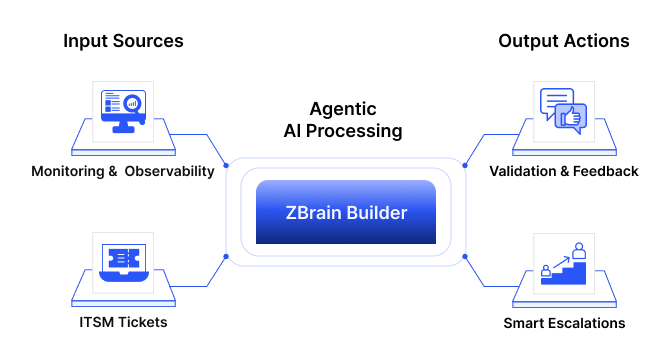
How agentic AI and intelligent ITSM are redefining IT operations management
Agentic AI marks the next major evolution in enterprise automation, moving beyond systems that merely respond to commands toward AI that can perceive, reason, act and improve autonomously.
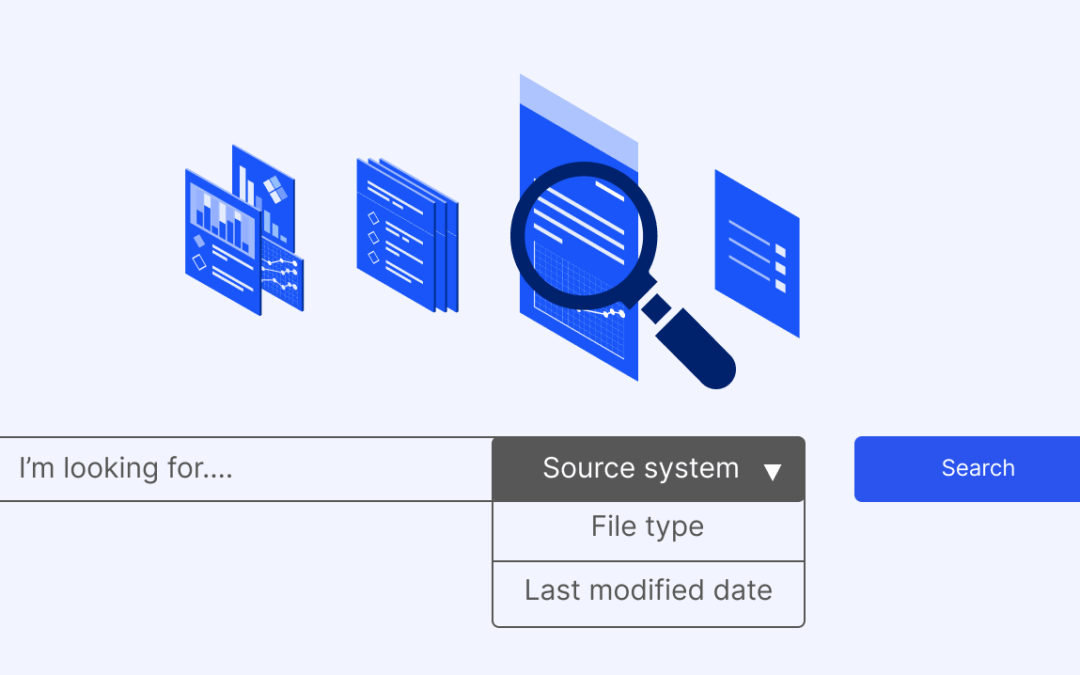
What is an enterprise search engine? A guide to AI-powered information access
An enterprise search engine is a specialized software that enables users to securely search and retrieve information from across an organization’s internal data sources and systems.
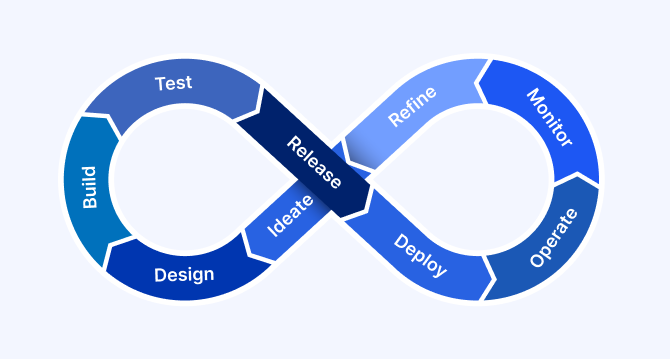
A comprehensive guide to AgentOps: Scope, core practices, key challenges, trends, and ZBrain implementation
AgentOps (agent operations) is the emerging discipline that defines how organizations build, observe and manage the lifecycle of autonomous AI agents.
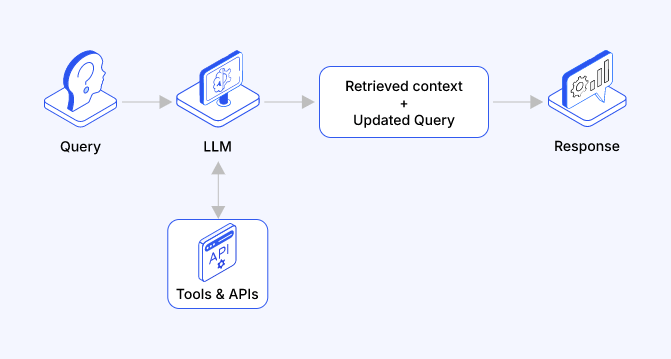
Adaptive RAG in ZBrain: Architecting intelligent, context-aware retrieval for enterprise AI
Adaptive Retrieval-Augmented Generation refers to a class of techniques and systems that dynamically decide whether or not to retrieve external information for a given query.
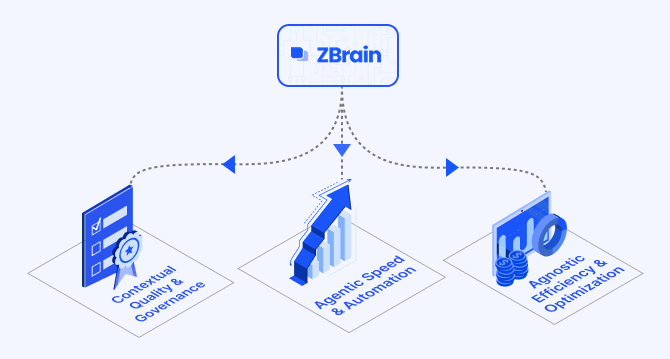
How ZBrain breaks the trade-offs in the AI iron triangle
ZBrain’s architecture directly challenges the conventional AI trade-off model—the notion that enhancing one aspect inevitably compromises another.
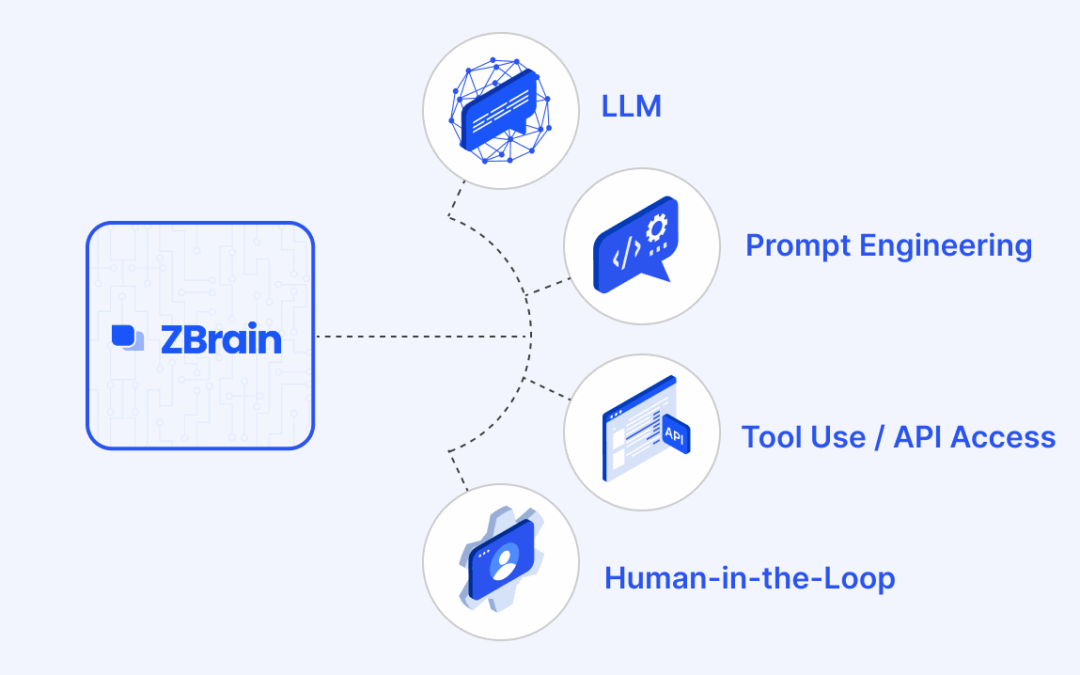
ZBrain Builder’s AI adaptive stack: Built to evolve intelligent systems with accuracy and scale
ZBrain Builder’s AI adaptive stack provides the foundation for a modular, intelligent infrastructure that empowers enterprises to evolve, integrate, and scale AI with confidence.





